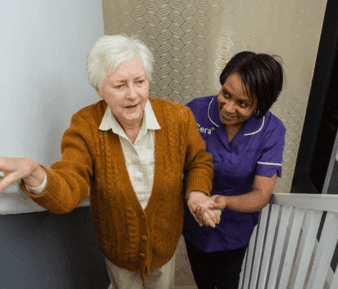5 Key Duties of a Carer
The duties of a Professional Care Assistant can vary day-to-day and client to client, however there are five main duties a care assistant can expect to cover on a daily basis. In this blog, we share the key duties of a carer so you can know what to expect if you’re considering starting a career in care.
What is a Carer? A carer is someone who provides support to others throughout their daily lives, who would otherwise be unable to manage without assistance. In short, a care assistant is someone who improves their service user’s standard of living and allows them to retain valuable independence in their own home.
Read more about becoming a community care assistant, including working hours and what the career entails on a daily basis.
Lots of different people require care for a variety of reasons. Here are a few below:
- Learning disabilities
- Elderly
- Disabled
- Long-term illness
- Brain injury
5 key duties
Domestic duties:
Providing effective care to a service user often includes assisting with domestic duties. This can include cleaning, cooking and doing laundry. Many service users require assistance with day to day tasks, ensuring that their needs are met and their environment is safe, comfortable and clean to maintain their health and wellbeing.
Aside from this, domestic duties can also include assistance with feeding and hydration, or simple tasks such as ironing. Care Assistants may also assist with administrative tasks such as paying bills, and keeping a record of each visit to communicate with the service user’s next care assistant. However, it’s important to maintain a promotion of independence wherever possible, encouraging the service user to do as much as they can/feel able to.
Companionship: For those at risk of loneliness, the companionship of a care assistant can make a huge difference in a service user's day to day life. A study on loneliness in the UK revealed that 6-13% of people over the age of 65 reported feeling lonely 'all or most of the time'. A lot of our service users fall into this category, and sometimes a carer may be the only source of interaction a service user has in a day. Find out more about how we can help the elderly to combat loneliness.
Spending time with a service user, whether that be a day out, accompanying them whilst food shopping/doing their day to day tasks or simply sitting down for a chit chat and a cup of tea, can make a positive impact on their lives.
Personal care:
For some of those just entering the care sector, the thought of providing personal care can seem quite intimidating and perhaps even uncomfortable. However, there are many reasons why a service user may require personal care, and the type of care this might include will vary visit to visit.
Some examples of personal care could include:
- Hair care
- Shaving
- Oral hygiene
- Skincare
- Maintenance of their toe and fingernails
- Assistance with washing
- Assistance with dressing
- Assistance using the toilet
Although this may seem daunting at first, consider that the service user may feel uncomfortable, or perhaps even embarrassed, at having to receive personal care. However, personal care is extremely important and helps maintain a person's dignity, health and wellbeing. Find out more about what personal care entails.
Mobility:
Mobility is an important aspect of care for those with reduced mobility, who may need assistance with completing day to day tasks. There are many reasons a service user may require assistance with their mobility, for example, this may be due to an injury, or a neurological or joint condition. Some people may require assistance with equipment to enable them to move around, such as hoists, walking aids or wheelchairs.
Issues surrounding mobility increase as we age, impacting how well we are able to move around. This could be unsteadiness while walking, difficulty getting in and out of chairs, or being unable to walk at all. The importance of mobility care is being able to assist a service user to complete their tasks if possible, rather than doing it for them.
As we are living increasingly sedentary lifestyles, this can affect us the older we get. Therefore, it’s important that we encourage our service users to try to stay active and move around as much as possible, helping prevent further injuries, conditions and weakness as time goes on.
We encourage our service users to stay active as much as possible, such as taking a walk or doing some form of exercise, or even encouraging them to dance along to the radio.
Health:
Another extremely important duty of a care assistant is to provide support to improve and maintain the health of our service users. You could be helping a service user with their daily medications, working with other healthcare professionals and family members to share and update information regarding a person's care, or providing information regarding an individual's care plan. Alongside this, you may be attending healthcare appointments with a service user, communicating with healthcare professionals to discuss the patient's circumstances and needs.
In 2024, our carers assisted our service users with medication 6.9 million times and supported our service users with their oral hygiene over one million times!
A career as a care assistant is extremely rewarding, where no two days are the same. Suitable for people that come from all walks of life. You’ll probably find that you already have many transferable skills that could be beneficial for working in care.
Find out more about transferable skills.
You can watch Gareth’s story here, as he explains why he left his career as a chef to become a Professional Care Assistant and why he decided to make the transition from the kitchen to care work.
<iframe width="560" height="315" src="https://www.youtube.com/embed/pI11ZwfJASk" title="YouTube video player" frameborder="0" allow="accelerometer; autoplay; clipboard-write; encrypted-media; gyroscope; picture-in-picture; web-share" allowfullscreen>
If you’re looking for a fulfilling role where you can make a real difference supporting people in your community, you can view our latest vacancies here.
More about working in care

Careers in care: Love what you do!
For many, this time of year makes you think of connection, compassion, and people who make our lives much better.
Helping Older People Beat the January Blues
For many older people, January can be one of the loneliest months of the year.

